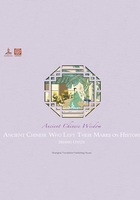
李清照 Lǐ Qīngzhào (1084-1151)
Ci’s Finest Female Poet
During the Song Dynasty (960-1279), Ci poems (or lyric poems) became vogue among the literati.
Some believe that Ci arose as words to older melodies transmitted from Central Asia. Each Ci poem is written to a certain tune which determines the number of Chinese characters in each line. As the Tang Dynasty (618-907 AD) was considered the golden age of Chinese poetry, the Song Dynasty was highly regarded as the prime time of Chinese Ci poems.
Naturally, during this period, a number of great lyric poem writers emerged and among them was Li Qingzhao.
Li was born in today’s Jinan in China’s Shandong Province. Her father was an open-minded imperial court official, who offered his daughter the privilege of a very good education. Thanks to her exceptional talent, Li established herself early as a peerless writer of poems and particularly lyric poems.
When she was 18, Li married Zhao Mingcheng, who shared her interest in writing poems and collecting paintings, calligraphy works and bronze ware.
After she married, Li’s life as well as her writing of poems was divided into two parts.
At the beginning, Li led a carefree life. Most of her lyric poems described the lonely life and melancholy feelings of young women from the upper society.
Li developed a distinctive Yi’an style of lyric poems, which features plain language, a delicate restraint, the blending of intense passion and literary images, and beautiful melodious rhythms. Li’s lyric poems are very easy to recite.
One of her most famous lyric poems during this period is the “Double Ninth Festival” to the tune of “Intoxicated Under the Shadow of Flowers.” And most critics agree the last three lines of this poem are the most appealing:
“Oh, no one will say that it’s not endearing,
When the west wind unfurls the curtain,
I feel that I have become more emaciated than the yellow flower.”

However, after the capital of the Northern Song Dynasty (960-1127) was invaded by the troops of the Kingdom of Jin, Li fled to the south and spent one year in today’s Nanjing, capital of east China’s Jiangsu Province. Her husband died of illness in 1129.
Alone, Li continued the journey to Lin’an (today’s Hangzhou in Zhejiang Province), the capital of Southern Song Dynasty (1127-1279).
The hardship and misfortune of her life had sharply changed her lyric poem style, which turned deep and pithy. In her poem to the tune of “Song of the South,” Li writes:
“The same old weather, the same old dress,
Only my feelings are different from the old times.”
Despite the drastic changes in her life, she continued to write the “Records on Metal and Stone,” a book she and her husband started to document more than 2,000 ancient texts about bronze works from the Shang and Zhou dynasties (1600-256 BC). Many of the valuable ancient books, carved stones, paintings and calligraphy works, as well as bronze ware Li and her husband had collected were damaged or stolen during the war.
In 1151, Li died alone in poverty, survived only by about 100 of her lyric poems and the “Records on Metal and Stone.”